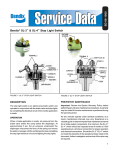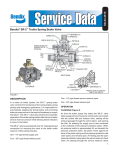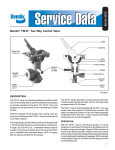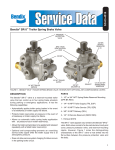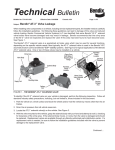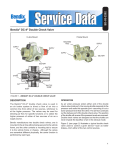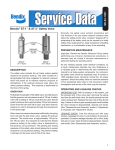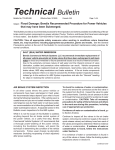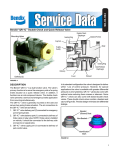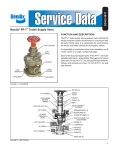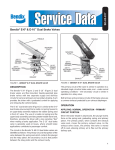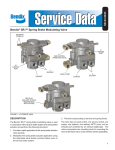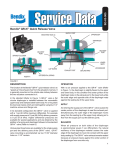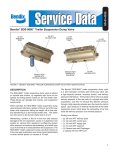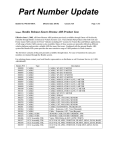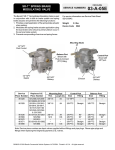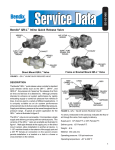Download BENDIX BW2739 User's Manual
Transcript
SD-03-4656 Bendix® SRC-7000™ Trailer Spring Brake Valve 1/4” NPT CONTROL 1/4” NPT SUPPLY 1/2” NPT SPRING BRAKE RESERVOIR EXHAUST 3/8” NPT DELIVERY (4) EXHAUST FIGURE 1 - BENDIX® SRC-7000™ TRAILER SPRING BRAKE VALVE DESCRIPTION PORTS The Bendix® SRC-7000™ trailer spring brake valve is a reservoir-mounted trailer valve that can control up to six spring brake actuators during parking or emergency applications. It has the following capabilities: 1 - 1/2" NPT Spring Brake Reservoir Mounting (RES) • Automatically applies trailer spring brakes in the event of a breakaway or trailer supply line failure. 4 - 3/8"-18 NPT Delivery (2 DEL) • Protects trailer reservoir(s) air pressure in the event of a breakaway or trailer supply line failure. • Does not allow an automatic trailer spring brake application with air pressure loss in trailer reservoir(s). 1 - 1/4"-18 NPT Trailer Supply (1 SUP) 1 - 1/4"-18 NPT Trailer Service (4 CONT) 1 - Exhaust (3 EXH) The SRC-7000 ™ trailer spring brake valve consists of a composite body, pressure protection valve and reservoir-mounting nipple. • Allows the trailer spring brakes to be applied and released repeatedly with a failed trailer reservoir(s): • Anti-compounding prevents an overriding service brake signal while the trailer supply line is at atmospheric pressure. • Does not allow service system charging if a failure occurs in the parking brake circuit. • Muffler & snorkel capable. 1 SER EM SER EM TRAILER SERVICE C D SRC-7000™ VALVE S D D D C D D D TRAILER SUPPLY D TO ACCESSORIES SER EM SER EM Trailer Schematic SER C-5™ CUT-OUT COCK EM DUMMY COUPLING TRAILER SERVICE SERVICE BRAKE CHAMBER R-12P™ PILOT RELAY VALVE S QUICK RELEASE D C SRC-7000™ VALVE C D SERVICE RELAY VALVE DUMMY COUPLING TRAILER SUPPLY C-5™ CUT-OUT COCK SER EM Towing Trailer Schematic FIGURE 2 - TYPICAL SYSTEM SCHEMATICS WITH A BENDIX® SRC-7000™ TRAILER SPRING BRAKE VALVE 2 TRAILER SUPPLY TRAILER SERVICE SERVICE/SPRING BRAKE RESERVOIR CONNECTION SUPPLY SERVICE RELAY VALVE DELIVERY SPRING BRAKE CHAMBER EXHAUST FIGURE 3 - CHARGING BELOW 85 PSI OPERATION CHARGING ABOVE 85 PSI (SEE FIGURE 4) CHARGING BELOW 85 PSI (SEE FIGURE 3) Once the air pressure in the valve builds to 85 psi, the air pressure flows into the trailer service reservoir(s). The trailer braking system is now in the normal run mode. Service braking occurs through the trailer service relay valve. Air flows through the trailer supply line, enters the trailer supply port of the Bendix® SRC-7000™ trailer spring brake valve, sealing the anti-compound section. The air passes through the quick release portion and out of the delivery port to the spring brakes. The air pressure then releases the spring brakes. TRAILER SUPPLY TRAILER SERVICE SERVICE/SPRING BRAKE RESERVOIR CONNECTION SUPPLY SERVICE RELAY VALVE DELIVERY SPRING BRAKE CHAMBER EXHAUST FIGURE 4 - CHARGING ABOVE 85 PSI 3 TRAILER SUPPLY TRAILER SERVICE SERVICE/SPRING BRAKE RESERVOIR CONNECTION SUPPLY SERVICE RELAY VALVE DELIVERY SPRING BRAKE CHAMBER EXHAUST FIGURE 5 - PARKING APPLICATION PARK APPLICATION (SEE FIGURE 5) To park the trailer, either the trailer air supply valve or the system park control valve (in the tractor) is actuated. This vents the trailer supply line. The service reservoir is sealed off. The quick release section, no longer under supply pressure, is moved by air pressure from the spring brake chamber. The exhaust opens, allowing air from the spring brakes to exhaust through the open passage. OPERATION WITH A FAILED RESERVOIR (SEE FIGURE 6) Should trailer reservoir pressure be lost, trailer service braking is no longer available. The Bendix® SRC-7000™ valve's internal spring force will trap approximately 70 psi supply pressure, thus preventing spring brake parking. TRAILER SUPPLY TRAILER SERVICE SERVICE/SPRING BRAKE RESERVOIR CONNECTION SUPPLY SERVICE RELAY VALVE DELIVERY SPRING BRAKE CHAMBER EXHAUST FIGURE 6 - OPERATION WITH A FAILED RESERVOIR 4 TRAILER SUPPLY TRAILER SERVICE SERVICE/SPRING BRAKE RESERVOIR CONNECTION SUPPLY SERVICE RELAY VALVE DELIVERY SPRING BRAKE CHAMBER EXHAUST FIGURE 7 - ANTI-COMPOUNDING APPLICATION ANTI-COMPOUNDING (SEE FIGURE 7) The Bendix® SRC-7000™ trailer spring brake valve has an anti-compounding feature. (See Figure 7.) A single check valve in the SRC-7000™ valve cover prevents brake compounding (simultaneous spring brake and service brake application), which creates extra load on foundation brake components. If a trailer service application is being made and at the same instant a park application is made, air in the service line closes the anti-compounding section of the SRC-7000™ valve. The air then flows out of the supply port and exhausts through the tractor protection control. Future compounding is prevented by the closed tractor protection valve. The anti-compounding port should not be used on towing trailers. See Figure 2. GENERAL SAFETY GUIDELINES WARNING! PLEASE READ AND FOLLOW THESE INSTRUCTIONS TO AVOID PERSONAL INJURY OR DEATH: When working on or around a vehicle, the following general precautions should be observed at all times. 1. Park the vehicle on a level surface, apply the parking brakes, and always block the wheels. Always wear safety glasses. 2. Stop the engine and remove ignition key when working under or around the vehicle. When working in the engine compartment, the engine should be shut off and the ignition key should be removed. Where circumstances require that the engine be in operation, EXTREME CAUTION should be used to prevent personal injury resulting from contact with moving, rotating, leaking, heated or electrically charged components. 3. Do not attempt to install, remove, disassemble or assemble a component until you have read and thoroughly understand the recommended procedures. Use only the proper tools and observe all precautions pertaining to use of those tools. 4. If the work is being performed on the vehicle’s air brake system, or any auxiliary pressurized air systems, make certain to drain the air pressure from all reservoirs before beginning ANY work on the vehicle. If the vehicle is equipped with a Bendix ® AD-IS ® air dryer system or a dryer reservoir module, be sure to drain the purge reservoir. 5. Following the vehicle manufacturer’s recommended procedures, deactivate the electrical system in a manner that safely removes all electrical power from the vehicle. 6. Never exceed manufacturer’s recommended pressures. 7. Never connect or disconnect a hose or line containing pressure; it may whip. Never remove a component or plug unless you are certain all system pressure has been depleted. 5 8. Use only genuine Bendix® brand replacement parts, components and kits. Replacement hardware, tubing, hose, fittings, etc. must be of equivalent size, type and strength as original equipment and be designed specifically for such applications and systems. OPERATIONAL AND LEAKAGE TESTS 9. Components with stripped threads or damaged parts should be replaced rather than repaired. Do not attempt repairs requiring machining or welding unless specifically stated and approved by the vehicle and component manufacturer. 1. Install a gauge in the trailer reservoir(s). Build the tractor and trailer to full system pressure by placing the park control valve and the trailer air supply valve in the charge position. As system pressure reaches approximately 75-95 psi, the trailer spring brakes should also build up to approximately 75-95 psi before the reservoir(s) begin to charge. 10. Prior to returning the vehicle to service, make certain all components and systems are restored to their proper operating condition. 11. For vehicles with Antilock Traction Control (ATC), the ATC function must be disabled (ATC indicator lamp should be ON) prior to performing any vehicle maintenance where one or more wheels on a drive axle are lifted off the ground and moving. PREVENTIVE MAINTENANCE Important: Review the Bendix Warranty Policy before performing any intrusive maintenance procedures. A warranty may be voided if intrusive maintenance is performed during the warranty period. No two vehicles operate under identical conditions, as a result, maintenance intervals may vary. Experience is a valuable guide in determining the best maintenance interval for air brake system components. At a minimum, the Bendix® SRC-7000™ trailer spring brake valve should be inspected every 6 months or 1500 operating hours, whichever comes first, for proper operation. Should the SRC-7000™ valve not meet the elements of the operational tests noted in this document, further investigation and service of the valve may be required. Check the tractor dash gauge against a gauge known to be accurate before performing these tests. Connect the tractor air lines to the trailer on which the SRC-7000™ valve is to be tested. Block all wheels or hold the vehicles by means other than the air brakes. 2. When full system pressure is reached, and the spring brakes are fully released, apply a soap solution to the SRC-7000™ valve exhaust port and the vent. A 1" bubble in 5 seconds is permissible. 3. Place the trailer air supply valve in the exhaust position. The spring brakes should apply. Disconnect the trailer supply line and apply a soap solution to check for leaks. A 1" bubble in 5 seconds is permissible. 4. Reconnect the trailer supply hose coupling and recharge the trailer system. The spring brakes should release. Shut off the engine and then open the trailer reservoir drain cock. The tractor air system should bleed down to approximately 70 psi. The trailer spring brakes should remain released. 5. If the SRC-7000™ valve does not function as described; or if leakage is excessive, repair the valve, or replace with a genuine Bendix® service replacement valve. Leakage through the welds is acceptable. REMOVAL 1. Identify and mark or label all air lines and their connections on the SRC-7000™ valve. Then disconnect the air lines. SERVICE CHECKS 2. Remove the SRC-7000™ valve from the reservoir. 1. Remove any accumulated contaminants. Visually inspect the valve’s exterior for excessive corrosion or physical damage. Replace the valve as necessary. INSTALLATION 1. Install the SRC-7000™ valve on the reservoir. 2. Inspect all air lines connected to the valve for signs of wear or physical damage. Repair or replace as necessary. 2. Reconnect all air lines to the valve using the identification made in REMOVAL step 1. 3. Test air line fittings for excessive leakage and tighten or replace as necessary. 4. Perform OPERATIONAL AND LEAKAGE TESTS before placing the vehicle back in service. 3. Install all fittings 2 to 2-1/2 turns past finger tight. BW2739 © 2010 Bendix Commercial Vehicle Systems LLC. All rights reserved. 08/2010 Printed in U.S.A. 6 Printed on recycled paper






